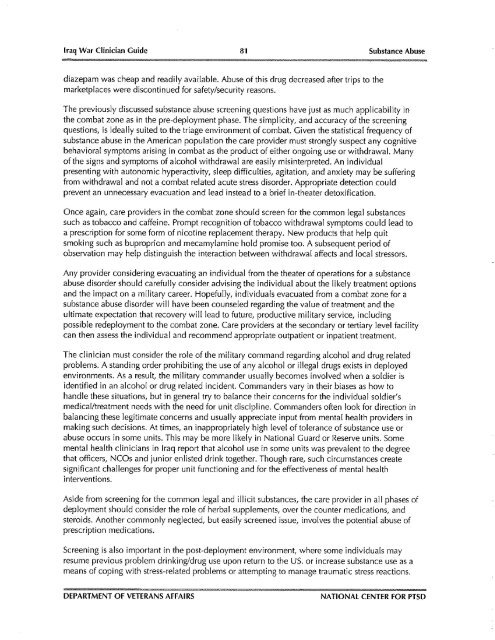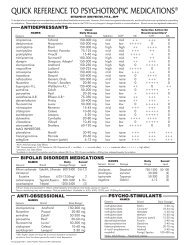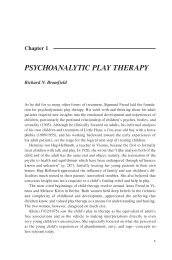IRAQ WAR CLINICIAN GUIDE
Iraq War Clinician's Guide - Network Of Care
Iraq War Clinician's Guide - Network Of Care
You also want an ePaper? Increase the reach of your titles
YUMPU automatically turns print PDFs into web optimized ePapers that Google loves.
Iraq War Clinician Guide 81 Substance Abuse<br />
--<br />
diazepam was cheap and readily available. Abuse of this drug decreased after trips to the<br />
marketplaces were discontinued for safetylsecurity reasons.<br />
The previously discussed substance abuse screening questions have just as much applicability in<br />
the combat zone as in the pre-deployment phase. The simplicity, and accuracy of the screening<br />
questions, is ideally suited to the triage environment of combat. Given the statistical frequency of<br />
substance abuse in the American population the care provider must strongly suspect any cognitive<br />
behavioral symptoms arising in combat as the product of either ongoing use or withdrawal. Many<br />
of the signs and symptoms of alcohol withdrawal are easily misinterpreted. An individual<br />
presenting with autonomic hyperactivity, sleep difficulties, agitation, and anxiety may be suffering<br />
from withdrawal and not a combat related acute stress disorder. Appropriate detection could<br />
prevent an unnecessary evacuation and lead instead to a brief in-theater detoxification.<br />
Once again, care providers in the combat zone should screen for the common legal substances<br />
such as tobacco and caffeine. Prompt recognition of tobacco withdrawal symptoms could lead to<br />
a prescription for some form of nicotine replacement therapy. New products that help quit<br />
smoking such as buproprion and mecamylamine hold promise too. A subsequent period of<br />
observation may help distinguish the interaction between withdrawal affects and local stressors.<br />
Any provider considering evacuating an individual from the theater of operations for a substance<br />
abuse disorder should carefully consider advising the individual about the likely treatment options<br />
and the impact on a military career. Hopefully, individuals evacuated from a combat zone for a<br />
substance abuse disorder will have been counseled regarding the value of treatment and the<br />
ultimate expectation that recovery will lead to future, productive military service, including<br />
possible redeployment to the combat zone. Care providers at the secondary or tertiary level facility<br />
can then assess the individual and recommend appropriate outpatient or inpatient treatment.<br />
The clinician must consider the role of the military command regarding alcohol and drug related<br />
problems. A standing order prohibiting the use of any alcohol or illegal drugs exists in deployed<br />
environments. As a result, the military commander usually becomes involved when a soldier is<br />
identified in an alcohol or drug related incident. Commanders vary in their biases as how to<br />
handle these situations, but in general try to balance their concerns for the individual soldier's<br />
medicalltreatment needs with the need for unit discipline. Commanders often look for direction in<br />
balancing these legitimate concerns and usually appreciate input from mental health providers in<br />
making such decisions. At times, an inappropriately high level of tolerance of substance use or<br />
abuse occurs in some units. This may be more likely in National Guard or Reserve units. Some<br />
mental health clinicians in lraq report that alcohol use in some units was prevalent to the degree<br />
that officers, NCOs and junior enlisted drink together. Though rare, such circumstances create<br />
significant challenges for proper unit functioning and for the effectiveness of mental health<br />
interventions.<br />
Aside from screening for the common legal and illicit substances, the care provider in all phases of<br />
deployment should consider the role of herbal supplements, over the counter medications, and<br />
steroids. Another commonly neglected, but easily screened issue, involves the potential abuse of<br />
prescription medications.<br />
Screening is also important in the post-deployment environment, where some individuals may<br />
resume previous problem drinkingldrug use upon return to the US. or increase substance use as a<br />
means of coping with stress-related problems or attempting to manage traumatic stress reactions.<br />
-*-<br />
DEPARTMENT OF VETERANS AFFAIRS<br />
NATIONAL CENTER FOR PTSD




